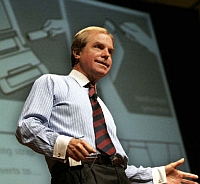Do you have an opinion on revolutionizing education in the developing world, using OLPC XO technology? Might you enjoy a good debate about One Laptop Per Child with Walter Bender, Ethan Zuckerman and I? Then listen in tonight at 7pm Eastern Time to Christopher Lydon's Radio Open Source: One Laptop Per Child?
There, you can hear the whole OLPC XO love-worry spectrum: who is positive or negative, or even schizophrenic about Children's Machine XO's.

Nicholas Negroponte of OLPC
But no matter your stance, we can all agree that Nicholas Negroponte has helped resurrect technology as a form of international development from its post-dot.com, dot.bomb malaise.
Now the debate is not if information and communication technologies (ICT) can increase the development of poor countries but how. For this, I thank and respect Dr. Negroponte.
Or as Steve Song, manager of Africa programs at International Development Research Centre, says in Fred J. Aun's "OLPC Orders Reach One Million Milestone" article for TechNewsWorld:
Ironically, all the debate about the project's pros and cons has actually done quite a bit to draw attention to the problem, said Song. "It has stimulated the private sector and there is a race to produce low-cost PCs for developing countries," he noted.So listen tonight to our debate on Radio Open Source: One Laptop Per Child? and let us know your opinion on the Children's Machine XO and its role in education via this wonderful blogging forum: OLPC News."It's also stimulated the debate about what is the meaning of introducing [personal computers] into the classrooms of developing countries. Is that the best thing you can do? The OLPC has become a lightning rod for these kinds of debates."


Radio Open Source streams live tonight at 7 PM EST:
- online at WGBH:
http://64.71.145.107/online/play.php?xml=897.xml
- on air across Public Radio:
http://www.radioopensource.org/about/listen-on-public-radio/
And will be available for download later at Radio Open Source:
http://www.radioopensource.org/about/listen-online/
You bring up price a lot. Cost is a major question. Who will pay? You think with the brain. OLPC talked about goals and ideas. Dreams for children. They think with the heart.
Both are needed to succeed.
I tuned in for this. Nice work Wayan. Funny, many of the questions I was curious about are the same ones you addressed.
You sounded very knowledgeable about the costs for the countries per child and then the future costs.
Cost and value questions/statements, from you, certainly kept the discussion on target and guided Walter & Lydon's interview.
Your speaking voice and chuckles kept the listener focused on what you were saying on Open Source about OLPC.
Stimulating discussion, you've had there. SWK has a point there. One reason the show was as focused had to do with tone. Contrary to many debates, even on Radio Open Source, this discussion remained quite thoughtful and, well, civil. In fact, what suprised me personally was that Bender didn't seem to be on the defensive too much. The reason it suprises me is that several members of the OLPC project seem to react very strongly to any hint of a potentially negative comment. As an anthropologist who favours critical thinking, the "don't criticise us, do something useful" attitude rubs me the wrong way. I can understand where it comes from. But, especially in the case of such a broad-reaching project, I see honest discussions about all possible ramifications of the project to be a necessity.
Not only tugging purse-strings and heart-strings, but actually thinking about all the contexts in which the project is being pushed. For instance, Lydon named Mali in the introduction to the show. There could have been an interesting discussion of the possible links between GeekCorps and OLPC over there. In my experience, many people in Mali are quite enthusiastic about technology and the social networks linking knowledge workers (hunters, healers, griots...) could benefit a lot from such tools.
So, congratulations on your constructive attitude! :-)